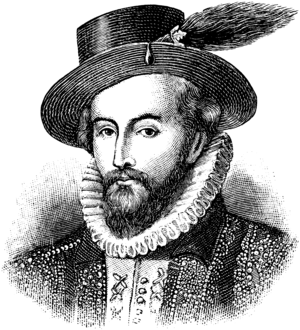U.S. History, Christianity, and Politics PART 5
This is a new series that will reflect on the rich history of the United States and the part Christianity, politics, corruption, racism, and persecution has played before and after this great nation began. It is important that we remind ourselves of the factual history of the United States and the important role Christianity has in this country today as well as to remember the hardships endured by the people of the past. Some of the actions of "Christians" have not been Christian like at all, and by reviewing history, we hope that mistakes are not repeated again. We will first cover the history leading up to the founding of the United States of America.
Gilbert, Raleigh, and the Roanoke Settlers
English nobleman Sir Humphrey Gilbert believed England should found colonies and find a Northwest Passage. In 1576 he sent English sea captain Martin Frobisher to look for such a passage. Frobisher scouted along the inhospitable northeastern coast of Canada and brought back large amounts of a yellow metal that turned out to be fool's gold. In 1578 Gilbert obtained a charter allowing him to found a colony with his own funds and guaranteeing the prospective colonists all the rights of those born and residing in England, thus setting an important precedent for future colonial charters. His attempts to found a colony in Newfoundland failed, and while pursuing these endeavors he was lost at sea.
With the queen's permission, Gilbert's work was taken up by his half-brother, Sir Walter Raleigh. Raleigh turned his attention to a more southerly portion of the North American coastline, which he named Virginia, in honor of England's unmarried queen. He selected as a site for the first settlement, Roanoke Island, just off the coast of present-day North Carolina.
After one abortive attempt, a group of 114 settlers-men,women, and children-were landed in July 1587. Shortly thereafter, Virginia Dare became the first English child born in America. Later that year the expedition's leader, John Smith, returned to England to secure additional supplies. Delayed by the war with Spain he did not return until 1590, when he found the colony deserted. It is not known what became of the Roanoke settlers. After this failure, Raleigh was forced by financial constraints to abandon his attempts to colonize Virginia. Hampered by unrealistic expectations, inadequate financial resources, and ongoing war with Spain, English interest in American colonization was submerged for 15 years.
CREDIT: "Our Great Nation" Resources for Teachers, 2002.
Technorati:us history,politics,christian history,christian-history,history,learn from mistakes
Labels: Learn from the Past, US HIstory


















0 Comments:
Post a Comment
Links to this post:
Create a Link
<< Home